- News
- Reviews
- Bikes
- Accessories
- Accessories - misc
- Computer mounts
- Bags
- Bar ends
- Bike bags & cases
- Bottle cages
- Bottles
- Cameras
- Car racks
- Child seats
- Computers
- Glasses
- GPS units
- Helmets
- Lights - front
- Lights - rear
- Lights - sets
- Locks
- Mirrors
- Mudguards
- Racks
- Pumps & CO2 inflators
- Puncture kits
- Reflectives
- Smart watches
- Stands and racks
- Trailers
- Clothing
- Components
- Bar tape & grips
- Bottom brackets
- Brake & gear cables
- Brake & STI levers
- Brake pads & spares
- Brakes
- Cassettes & freewheels
- Chains
- Chainsets & chainrings
- Derailleurs - front
- Derailleurs - rear
- Forks
- Gear levers & shifters
- Groupsets
- Handlebars & extensions
- Headsets
- Hubs
- Inner tubes
- Pedals
- Quick releases & skewers
- Saddles
- Seatposts
- Stems
- Wheels
- Tyres
- Health, fitness and nutrition
- Tools and workshop
- Miscellaneous
- Buyers Guides
- Features
- Forum
- Recommends
- Podcast
news
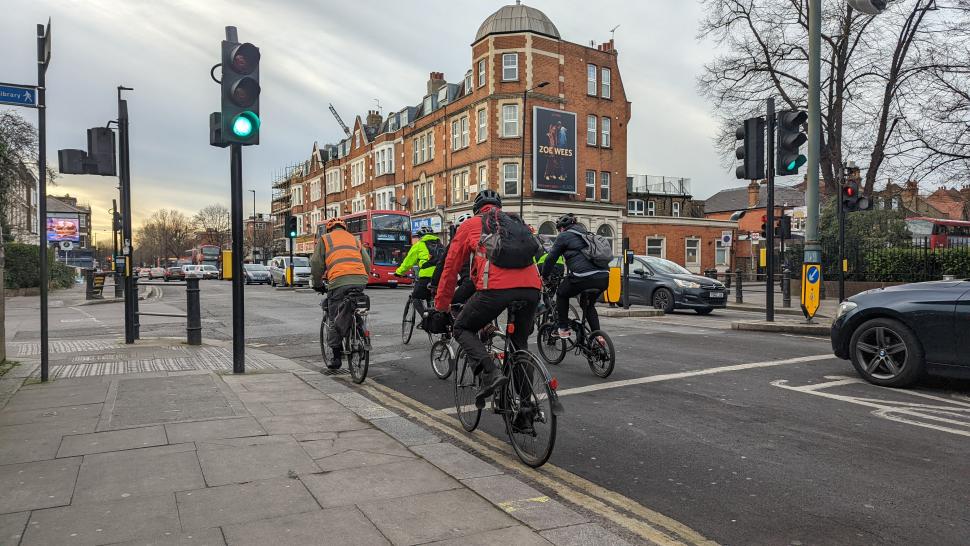 Cyclists at traffic lights, London © Simon MacMichael
Cyclists at traffic lights, London © Simon MacMichael“A second-hand bike costs the same as two tanks of fuel”: Cyclists react to “joke” survey which found that almost half of Brits believe they can’t afford to buy a bike
“How much is motoring insurance, tax, MOT, servicing, repairs, and fuel when you add it all up?” That’s the question currently being posed by baffled cyclists across the UK, after a new survey examining attitudes towards cycling found that almost half of Brits believe they cannot afford a bike, with yesterday’s story on the somewhat contentious study attracting hundreds of confused comments on road.cc and across social media.
The survey was carried out by BHN Extras, the parent company of Cyclescheme, the UK’s largest provider of access to the Cycle to Work initiative, as part of its annual research into perceptions of, and barriers to, cycling in the UK ahead of Cycle to Work Day on 1 August.
Gathering responses from 2,000 people employed across a range of sectors in the UK, the study found that 49 per cent of those surveyed believe that they are not currently in a position to buy a bike outright.
A quarter of those consumers also stated that it would take at least six months to save to purchase a bike, with 50 per cent noting that they would be most likely to buy a bike by splitting the cost and 22 per cent stating that the cost of accessories acts as a deterrent to encouraging them to cycle to work.
Meanwhile, concerns about the stereotypical image of a cyclist also featured prominently in the survey, with 58 per cent of respondents believing that they “don’t fit the bill” of what a cyclist apparently represents.
However, it’s the survey’s headline finding – that almost half of Brits think they can’t afford to buy a bike (though, it must be noted, the survey doesn’t attempt to ascertain why that’s the case) – that has fuelled quite the conversation online.
“That’s ridiculous,” X/Twitter user Chrissetti said in response to yesterday’s story. “It might be too expensive to buy a brand-new bike, but you can get second-hand ones dirt-cheap. You’re not going to win the Tour de France on it, but it’ll be good enough as a commuter bike.”
A road.cc reader concurred: “What a joke. I spent £50 on a second-hand mountain bike in 2011 which I use to commute. I still use it now, and would reckon I’ve done 10,000 miles on it in total. No expensive gear, just helmet, gloves, lights, and waterproofs (which I’ve hardly ever used as it rarely rains enough to warrant it).
“Anyone new to cycling doesn’t need to spend thousands of pounds initially until they know they will continue and want to upgrade.”
Meanwhile, another road.cc reader offered up this handy piece of buying advice: “Buy an early 90s Kona MTB, put some slicks on it. Best commuting bike you’ll ever own. Job jobbed.”
I paid £110 for this bicycle in 2011. It is now 50 years old. I use it for commuting - about 18 miles a day. It works perfectly and has required almost no maintenance. pic.twitter.com/DKKd2mYxTh
— Robert Rhodes (@ra_rhodes) August 2, 2024
Over on Facebook, Chris Alston added: “There are many bike recycling projects across the UK. We don’t all need to buy new. There are some great second hand or pre-loved refurbished bikes available for a good price. The second-hand market has been flooded with bikes that were snapped up during the early stages of the pandemic.
“The Cycle to Work scheme is always an option for those whose employers are signed up. Cycling UK has a Cycle Friendly Employer Scheme to encourage businesses to make the necessary changes to support those who wish to cycle to work. They also have various programmes to help new or returning cyclists build up confidence, fitness, and learn new skills such as cycle maintenance. There’s help available. Some local authorities have certain schemes too.”
While the relatively low cost of buying a bike (unless you’re in the market for the latest S-Works, of course) was a common feature of many of the replies to the story, some readers couldn’t help but point out that, of the 49 per cent who claimed they don’t have the funds for a bike, a decent proportion would be more than happy to spend their hard-earned wages on buying, maintaining, fuelling up, taxing, and insuring a car.
One road.cc reader said: “Given that there were 41.2 million registered vehicles in the UK at the end of 2023, and that according to the 2021 census, there were 37.5 million people of working age, it would be interesting to know how many of those surveyed don’t think they can afford a bike because they already spend a good proportion of their income on owning a car.”
“Can’t afford to buy a bike? You can get one for about £100, and it costs nothing to run. Yet they can afford to run a car, which costs thousands to keep on the road?” asked Lee Jones on Twitter.
“Going with total bullshit for that,” added SCo. “You can pick up a working bike off Facebook marketplace for £50 every day. Even if you budget another £50 for service, that’s about two tanks of fuel, ride to work for a few weeks and the bike has paid for itself.”
“How much is motoring insurance, tax, MOT, servicing, repairs, and fuel when you add it all up?” asked Pooka, a question answered by the Twitter account ‘Yeah But Cyclists’: “Can’t afford a bike which could cost as little as £300 (or even less second-hand) and virtually nothing to maintain or run, but they can afford £1,000+ per year to maintain and run a car?”
However, not everyone was up in arms about the survey’s main finding, with some criticising the rising prices associated with the bike industry in recent years.
“The industry has been pushing prices up and up for years,” said Tom Stringer on Twitter.
Facebook user Paulo also added: “Cycling has become a stupidly expensive sport, it was never very cheap, but nowadays it is too much.
“Some years ago, a reasonable/good bike would have components of some quality and would cost a maximum of £500. Nowadays with £500 you can barely buy anything with two wheels. Something will have to be done to counter this situation and make cycling accessible to the masses again.”
Some, meanwhile, noted that there are other reasons – beyond costs – that prevent them from commuting by bike.
“I would love to cycle to work but the idea of 20km down the A57 in rush hour terrifies me... It’s definitely the idea of sharing space with white vans and w***panzers that puts me off,” said one road.cc reader.
However, others were quick to note that the survey’s findings, detailing the arguably prohibitive costs of cycling, were published by a company whose aim is to encourage people to buy new bikes at a discounted rate.
“Putting aside all the comments regarding how many and who can or can’t afford a bike (in reality anyone who wants a bike can have one, whether it’s bought new, used, or received from charitable source), the upshot is that this so-called ‘research’ was commissioned by a company that has a financial interest in getting as many people as possible to repeatedly buy new bikes via a salary sacrifice scheme, within which they charge one of the highest commission fees in the industry,” said one road.cc reader.
“As with most ‘surveys’ the organisation paying the bill gets the outcome they ask for.”
This led on to a broader discussion surrounding the Cycle to Work scheme in general, which has faced a turbulent period in recent months, as local bike shop owners and traders united earlier this year to criticise a system that they believe is “too complicated”, damaging to retailers, no longer fit for purpose to get more people cycling to work, and in “need of urgent systematic change”.
“The trouble with the Cycle to Work scheme is that most low earners are not allowed to use salary sacrifice because it would take them below the National Minimum Wage,” noted a road.cc reader. “Low earners cannot buy a bike tax-free through Cyclescheme. The government must fix this.”
And Colin McCullough on Facebook said: “The Cycle to Work scheme is bad for local bike shops due to the fees, and privileges higher earners, in company employment linked to the scheme. It discriminates against low paid, unemployed, retired, self-employed... Why not simply cut the VAT rate on bikes? And/or have a rental/leasing scheme, with insurance and maintenance included? Creativity needed from government?”
“The cycle schemes can’t take you below minimum wage, and given how much the minimum wage has gone up in relation to wages in general I wouldn’t be surprised if people can’t afford to take advantage of it,” said Sean.
“However, nearly every major bike retailer has sales on right now, you can pick up a decent bike for not much in the grand scheme of things. Even if you had to pay interest, the money saved on fuel would likely be enough to cancel it out.”
What do you think? Is cycling becoming unaffordable, hindered by a Cycle to Work scheme which does little for lower earners? Or are there more than enough cheap and second-hand bikes floating around to get the UK cycling to work? Let us know in the comments…
Ryan joined road.cc in December 2021 and since then has kept the site’s readers and listeners informed and enthralled (well at least occasionally) on news, the live blog, and the road.cc Podcast. After boarding a wrong bus at the world championships and ruining a good pair of jeans at the cyclocross, he now serves as road.cc’s senior news writer. Before his foray into cycling journalism, he wallowed in the equally pitiless world of academia, where he wrote a book about Victorian politics and droned on about cycling and bikes to classes of bored students (while taking every chance he could get to talk about cycling in print or on the radio). He can be found riding his bike very slowly around the narrow, scenic country lanes of Co. Down.
Latest Comments
- Sam3 2 sec ago
I'm suggesting they are keeping the option to later on add a model in the product range that is electric powered, but I'm not suggesting it will be...
- Aluminium can 28 min 7 sec ago
Keep the cut off end of a zippy tie to dipstick your tyres. It has little grooves on the surface and it fits down the valve tube.
- wtjs 2 hours 42 min ago
It's some catch, that Catch 22: swear and the police go after you for a public order offence, don't swear and you were obviously not ...
- wtjs 2 hours 52 min ago
we are now out of time to offer the driver a suitable education course or to issue proceedings at court, for which I apologise again...
- chrisonabike 2 hours 55 min ago
Perhaps if you've never used the catalogue ordering system before it's really frustrating?
- JN35000 3 hours 5 min ago
First off, congrats for an informative and well-written article....
- brooksby 3 hours 13 min ago
'Universal smart phone possession' isn't the same thing as having your smartphone accessible and mounted in sight at all times....
- ktache 3 hours 44 min ago
I saw a documentary about "distracted" driving, probably on PBS, cameras recording every action of the driver, initially very cautious, after a...
- the infamous grouse 4 hours 2 min ago
almost sounds like the spoke holes were drilled at 0°/0° and not in alignment with the intended spoking pattern.
- robike 4 hours 31 min ago
No mud guards on any of them!
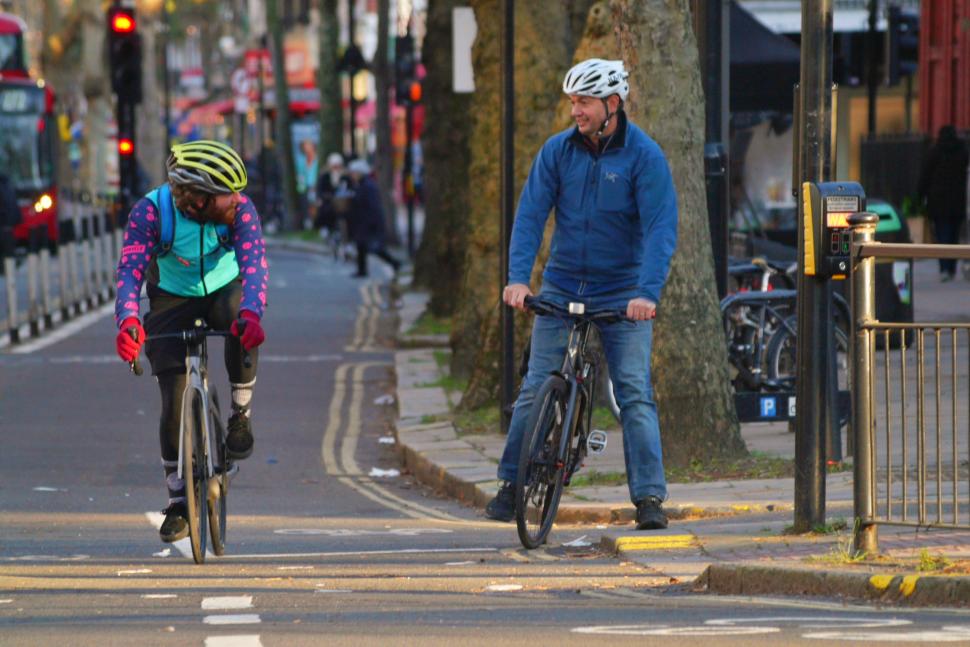
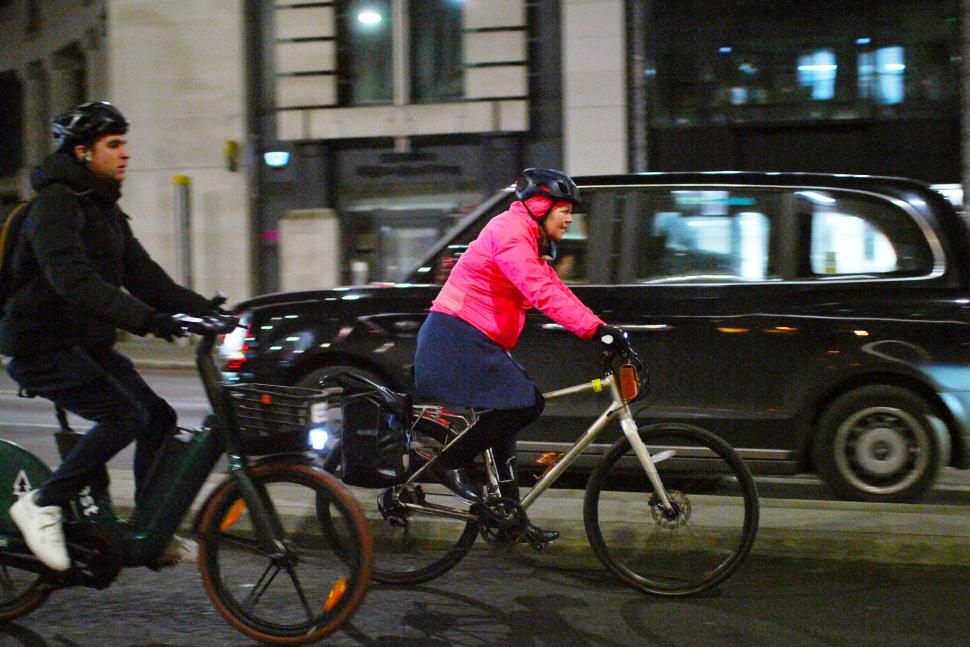
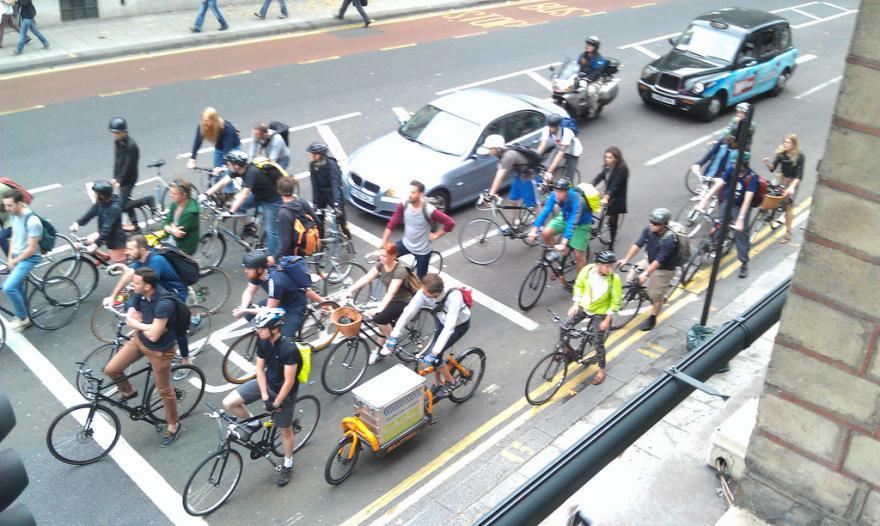
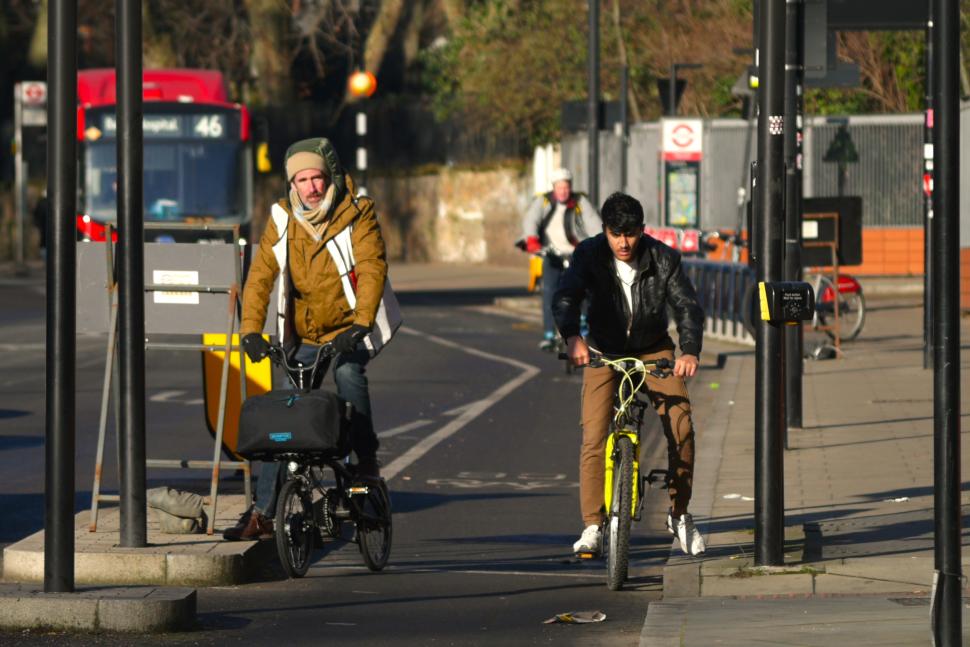
Add new comment
97 comments
The idea that you have to buy an old bike is interesting, of course you can, but I've got four, and they were all given to me; two of them were hand made racers which I saved from going in a skip! Admittedly I've spent a few bob on paint, grease, oil, and things like cables and brake blocks, but you have to buy those, even on a new machine. All my bikes are made in England, lugged steel frames and will last for years longer than I'll manage. Don't buy anything until you've asked around, buy a book on bike maintenance though, their simple enough.
It's kinda ironic that when I flicked into this article from a newsfeed on my phone, the 3x adverts it flashed at me were all for bikes with a 4995 price tag.
It's hardly surprising people think that cycling is expensive.
It's also unreasonable to think that a non-cyclist will go and buy a second-hand bike for £150 when the first things they will think are (a) it's probably going to break on me at that price and I know nowt about checking it out, and (b) it's probably stolen since there are so many news stories about bikes just being nicked and resold and nobody doing anything about it.
But I guess the "survey" wouldn't bother to capture the thought process that inhibits people.
Most non-/casual cyclists aren't generally reading road.cc, though (notwithstanding claims of 'reach' of 10.4m...).
walk into the vast majority of bike shops and you wouldn't be finding any bikes inside for less than £1000 other than kids bikes. Unless you are looking at BSOs from halfords or other motoring shops
Bit unfair on Halfords - they've plenty decent bikes at decent prices (as well as some BSOs), as do Decathlon and Evans, especially for newbies. I'd guess those chains might have as much influence on non-cyclists' ideas of what bikes cost than more specialist retailers.
The latter do seem to have moved towards the upper end of the market - whether that's because of their own preference, or it's really what their customers want to see, I don't know. A more serious survey than reported here might have shone some light but it was hard to take it seriously.
Don't know what bike shops you're walking into, but I just checked a few of our local ones (granted, online, but I doubt it's much different in store) and I can find bikes from all of them at 300-odd quid without even really looking.
Add mudguards, rack, panniers, lights that are worth using, lock and £300 is just the start. That's what startles potential buyers
Not everyone is obsessed with mudguards, panniers and racks you know.
Though anyone who wants a bike to get to work and back and to and fro to the shops in all weathers may well consider them essential.
Well, in the example you quote, I would hope that the individual would be dropping a lot more than £300 on the mode of transport that they rely on for going to work and back and to and fro to the shops in all weathers.
my first commute bike was less than £300, my 2nd which lasted best part of a decade about £300, my current bought this year was £500.
you dont need to spend thousands on a good bike, there are plenty of good bikes that are considerably cheaper.
One of my sons cycles daily to work on the bike he bought ten years ago, the other last year bought himself a s/h Decathlon Shimano 105 equipped bike in very good condition for less than £200 last year for that purpose, since he has spent or been birthday presented about about another £100 of rack, lights etc, so it's entirely possible even for a really quite high quality bicycle.
That still won't get you anywhere close to £1000.
Halfords can be excellent. I know some here will have had a dodgy experience, but you can have those at boutique bike shops and old school racing shops.
There are even a few second hand shops in my part of SE London. But they're not particularly cheap if they're diligent in selling safe products and comply with sale of goods.
Numerous friends and neighbours already have bikes they don't use unused, tyres & tubes decay, oil has congealed to glue and corroded cables and chain. I've quoted £150 to £200 to make their bike roadworthy - which tends to match what they hear from shops. I buy parts at retail price, the shop gets them at trade but has to pay staff, rent, & rates
All the adverts I see are for cars that are more than my yearly salary, often a LOT more. Therefore all cars are overpriced.
Perhaps it's because they have electric windows, electric tailgate closure and automatic gears (because we're lazy), sat-nav, infotainment and connectivity (because people can't be arsed with maps or planning a route and driving is a chore so we need a distraction), air-con, heated seats and steering wheel (because we're feckin' nesh). If you take out a load of those unnecessary gadgety things... nah, they'll still rip us off.
I appreciate that it's not quite the same thing, but my wife always grumbles when I tell her how much I've paid for this or that repair on my commuter bike at our LBS. "That's almost as much as I paid for [repair] on the car!", she cries. When I point out that the labour costs and time for a skilled mechanic to do the work, and that the parts are similar prices too (remember, my car is historic so parts are (relatively) cheap), she chunters about it but walks away.
My point is that a lot of people who don't ride bikes regularly, think that even £150 for a second-hand probably stolen bike is far too expensive. They expect to pay cheap toy prices for what they think is just a big toy, and they expect to pay pennies for repairs on the same.
IMO, anyway.
I think there's also an element of 'But I could do that myself! (if I bothered to learn)' with a bike, that doesn't get applied to cars, too. Bicycles are seen as simple things that should be quick and easy to fix, whereas cars are complicated machinery that require a specialist and a lot of sucking of teeth.
They also think bikes should cost same as in their childhood 30 to 50 years ago. Eg, way back in 1980s, my mother expressed astonishment at me paying £400 for Reynolds 531 tfs with decent wheels, brakes etc. She only paid £X for her top of the range Hercules sometime before, during, or after WW2 when she rode to work as nurse in blitz. Turned out prices were same in relation to pay, inflation, cost of living. She didn't have the same mismatch in thinking about cars
Once I would repair or replace any defective component on my car, now there is very little on a modern car that can be economically repaired by a home mechanic. Sadly (and ludicrously) it seems many bicycles are heading in the same direction. Fortunately my own is still of a vintage where a well thumbed copy of Richard's Bycycle Book and a set of modest tools will solve most issues.
All the bikes in my shed are of that ilk.
TBH so are our cars. I could fix most of it with a 10mm spanner and/or a screwdriver (supported by a Haynes manual and a copy of 'How to keep your Volkswagen alive'), but my wife doesn't trust me…
If you exclude Di2, the only new skills I've had to learn since learning to fix bikes in the 80s/90s have been replacing brake pads in disc brakes - very simple - and putting new brake fluid in hydraulic systems - fiddly but not difficult. Otherwise the basics remain the same and indeed some things – crank removal and fitting new chains, for example – are a good deal more straightforward than they once were.
How have crank removal and fitting a chain become more straightforward? Fitting a chain is the same as it always was, except that you can't use any old chain tool as you used to be able to. And removing cranks and BBs also requires more specialised tools than it used to. I'd be reluctant to touch the cranks on a modern bike without first checking the instructions. It wouldn't have entered my head to do so thirty or forty years ago.
Fitting a chain is much easier since the invention of the quick link, way easier than trying to hold the two ends together whilst trying to get the rivet in to the exact depth, continually backing out and checking. To remove my Shimano cranks I have to remove the cover, which can be done with a large screwdriver or the end of my chain whip, unscrew the two allen key bolts and it just pulls off. Forty years ago you needed a specialist crank puller tool for that.
Not to mention Shimano outboard Hollowtech BBs (threaded) require a simple but specific spanner, whereas a square taper requires a seperate socket and wrench, which is much more fiddly. Of course, pressfit BBS are more difficult (which is what I assume John_smith is talking about) but a lot of manufacturers have been moving back to threaded.
I think I'd add to that more hub designs are using cartridge bearings now which are very cheap and easy to change out, with thru-axles compared to cup and cone bearing replace and adjust.
You forgot to mention the hammer for getting cotter pins out and the two hours of filing the new ones to get the fit right!
Agreed. And I suspect almost everyone who can't afford a bike also can't afford a car. It's cost of roof over head that swamps everything so folk are a single room or couch surfing in houses rammed with fellow renters - no space for bike or tools. A really bad article that merely mocks people and, if read by potential cyclists, likely to put them off cyclists
It's sort of missing the point to mock people who think they can't afford a bike.
Why be snooty towards people when you're part of a group that could do with all the allies we can get?
The main thing to take from that survey is that people perceive cycling to be expensive. It doesn't matter if they're correct or not, what matters more is perception.
And sure 2nd hand bikes are cheaper, but buying anything 2nd hand is a complete minefield these days, and a lot of people if they're naive about cycling around going to feel confident measuring up a 2nd hand bike.
In fact most of the time when friends, family, neighbours hear I've got a new bike the primary question is "how many gears has it got?" - the implication being more is better. Sure, that 27 speed triple is better than a 12sp mullet... But that's the point, if we want to get more people "on our side" we have to help and educate them, not sneer at them.
Not seeing the snooty particularly. I think most people are deriding the *survey*. Seems at best set up to give a suitable answer for those who commissioned it, possibly just a compilation of responses from the more ... left field thinkers or people who never considered cycling for transport before and won't in the future.
As for allies - a good thought but this falls into the "encouraging cycling" category. We love that in the UK! Encouraging it with warm words, with limited training courses, with occasional pennies in the tenner relative to the general transport budget...
Not going to do anything more than it has over the last half-century.
Things like "education" could make a difference... *when* there's genuine commitment (and money) to make safe and convenient places for people to actually ride (and park) those bikes. Or tackle the (currently illegal!) behaviours by drivers which make it not an option most people genuinely consider. And ultimately reduce the convenience for driving, just slightly.
At that point... we could get lots of people riding. But probably still few "cyclists":
https://m.youtube.com/watch?v=vMed1qceJ_Q
https://www.cycling-embassy.org.uk/blog/2019/07/01/a-bike-for-people-who...
Absolutely so in my own case.
I'm curious what a "12sp mullet" is though.
Pages